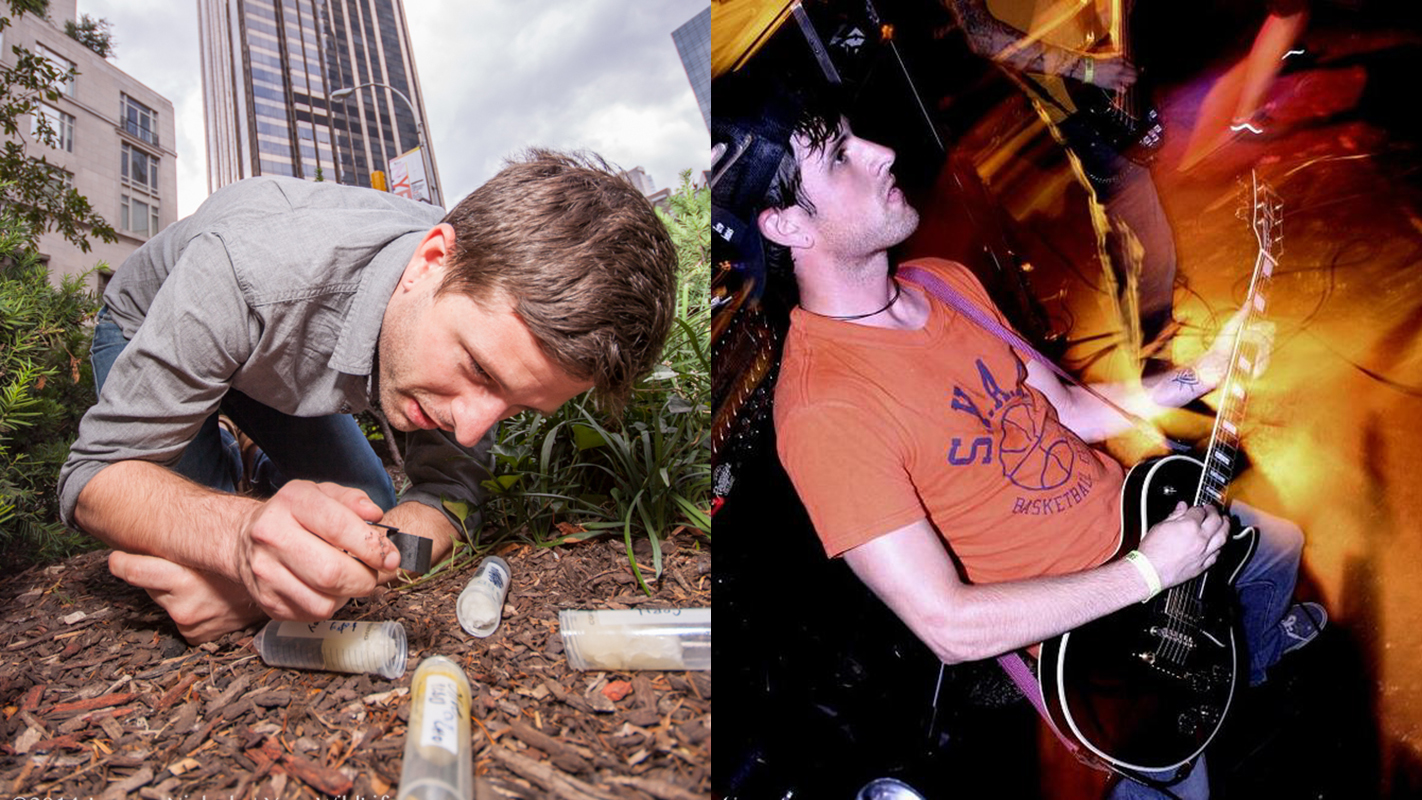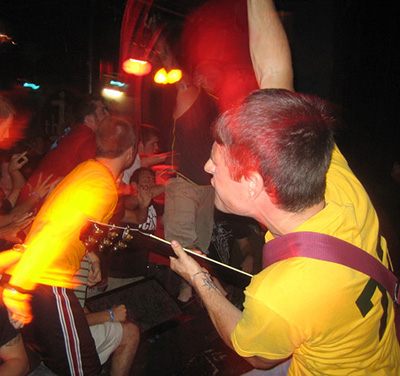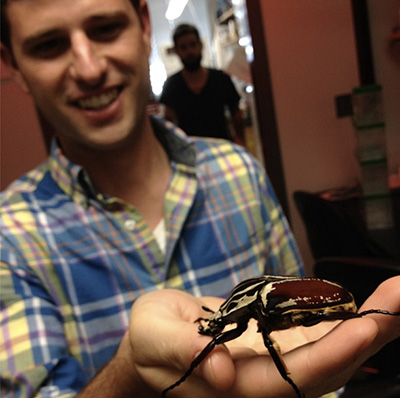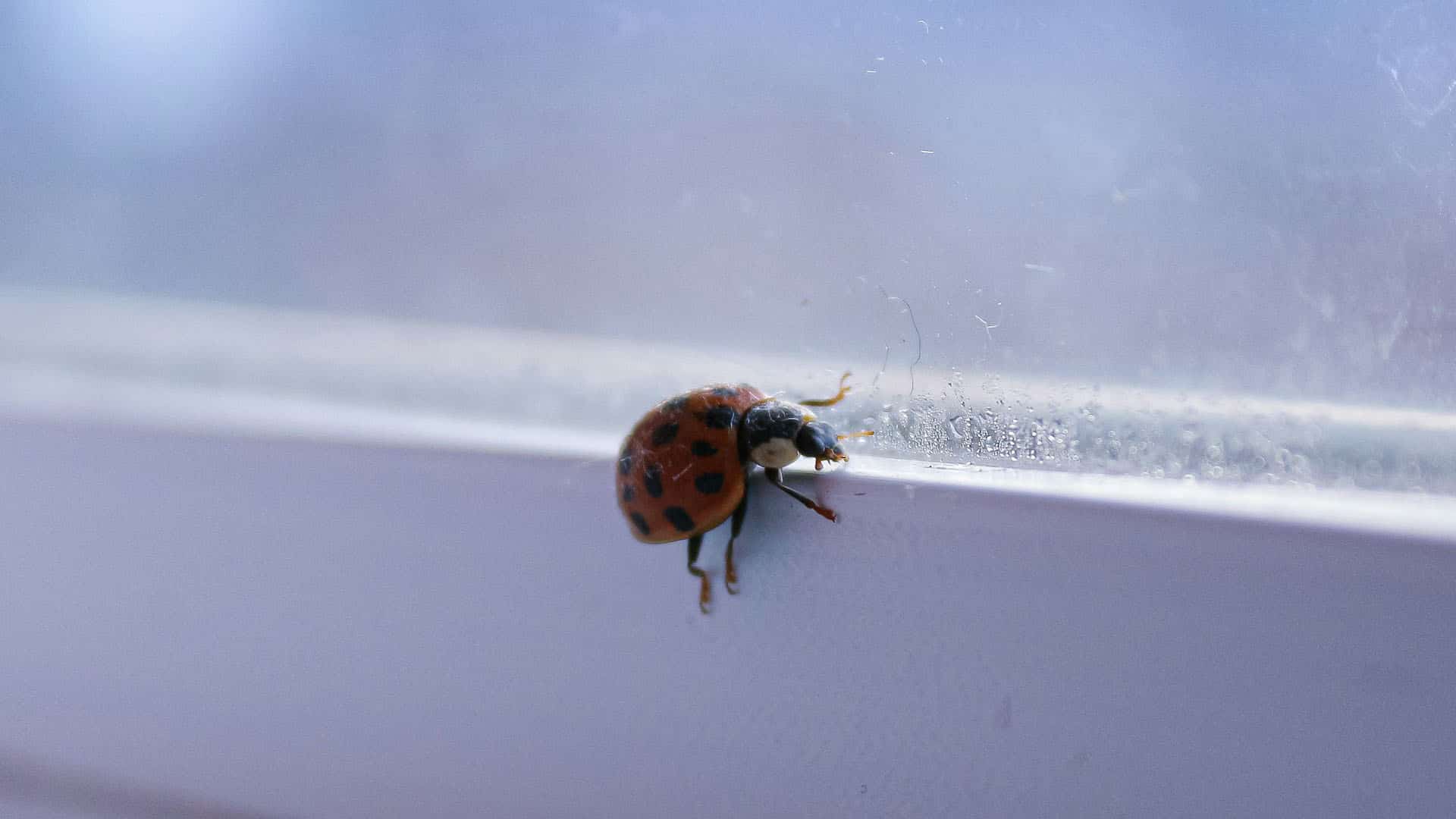From Punk Guitarist to Research Entomologist

Clint Penick is interested in the evolution of social traits in insect societies. He studies ants. But before becoming a full-time scientist he was a guitarist in hardcore punk band Kids Like Us.
Penick toured the U.S. with Kids Like Us, recording two LPs and two EPs with the band before leaving the East Coast to go to graduate school in Arizona.
The transition from punk to science isn’t unheard of – Milo Aukerman (Descendents) and Greg Graffin (Bad Religion) are big names in punk who have also made careers in the lab. But we wanted to know what led Penick, who’s now a postdoctoral researcher at NC State, to trade in his guitar for the lab bench. And whether he found any similarities between touring with a band and studying insects.
The Abstract: When did you start playing guitar, and what drew you to punk?

Clint Penick: I got my first electric guitar when I started middle school. That was around the same time Nirvana took off and there was this idea that anyone could start a band in their garage and start playing shows. After Nirvana, I started getting more into punk bands like Black Flag and the Descendents. When I went to my first punk show and saw people stage diving, that’s when I thought, “I want to be in a band that makes people do that.”
TA: When did you start playing in bands, and how many bands were you in before joining Kids Like Us?
Penick: My first band, coincidentally enough, was called the Army Ants. We started playing together in sixth grade and wanted to sound like Operation Ivy or Screeching Weasel. We were so young that our parents had to chaperone us when we played at local bars. In hindsight, it must have been pretty embarrassing for older bands to show up and realize the opening act was a bunch of 13-year-olds. I continued playing with bands throughout high school, but things got more serious in college when I joined Kids Like Us.
TA: After high school you attended Florida State, and you were still a student when you joined Kids Like Us. How did you juggle schoolwork with your touring and recording schedule?
Penick: It was clear at the beginning of Kids Like Us that this was going to be something different. Several of the other band members had come out of successful bands, and we had a following before we played our first show. Within a few months, we landed a modest record deal and started touring the country. We organized major tours over Christmas break and during the summer to work around my college schedule. But aside from that, everything about Kids Like Us fit into what you might expect of the punk lifestyle—we trashed hotel rooms, got into fights, and were banned from dozens of clubs on both sides of the country. My only regret was missing my chance to play the Whiskey A Go Go, a famous club in West Hollywood, because I had to stay in Florida for exams.
TA: Did you already think that you were going to become a scientist, or did you consider becoming a full-time musician?
Penick: Becoming a full-time musician was never really on my mind. For one thing, there were way better guitar players in the bands I toured with. Also, the style of music we played was not really something where you could go on MTV and make a lot of money. What I liked about Kids Like Us was that we got to travel around the country and see places I probably never would have otherwise. That’s something that also drew me to science, but by then I was more interested in travelling to places that were even more remote than Evansville, Indiana or whatever other towns our band used to play in.
TA: What drew you to entomology, and to ants in particular?

Penick: From the name of my first band [the Army Ants], you can tell I’ve been into ants for a long time. I grew up watching ants in my backyard, and the first paper I published was actually a study on fire ants I conducted in my backyard in between tours with Kids Like Us. Now I’ve had the opportunity to study ants on three continents, and I’ve even sent ants into space. I continue to be fascinated by their societies and trying to figure out how they work. [Editor’s note: Penick’s work has explored everything from ant societies with warrior queens to urban ant diet.]
TA: Have you found any similarities between being a working musician and being a research scientist?
Penick: In both jobs you get to do a lot of traveling. While I spent summers in college on tour with Kids Like Us, now I spend summers in the field doing research. But what’s great about being a scientist or a musician is that you get to do a job you’re passionate about. I get a similar feeling when I have a new research paper come out to what I did when Kids Like Us released a new album. Surprisingly, my research papers actually get more coverage in the press. But in any job, there are tradeoffs. In science, we have to write grants to convince people to fund our research, and in music, we actually made most of our money selling T-shirts. Our music in Kids Like Us was okay, but we had really great T-shirts.
TA: Punk is famous for its “DIY” [do it yourself] ethos. Has that informed your work as a scientist at all?
Penick: When you learn science in high school, you usually follow a protocol given to you by the teacher. Working in science is really nothing like that. There are no cookbooks or instructions, so you basically have to figure everything out on your own. That’s definitely in line with the DIY ethos. I remember a time in grad school when I needed a hypobaric chamber to test a hypothesis about how ant colonies responded to changes in air pressure. We didn’t have one, so a friend and I used parts lying around the lab to build something that would work. The experiment never really panned out, but it was a good lesson that if you really need to do something, you can do it yourself.
TA: Milo Aukerman has a successful career as a scientist, but still comes out of the lab to play gigs every once in a while with Descendents. And Greg Graffin still tours with Bad Religion. Do you think you’ll ever play with a band again?
Penick: I wouldn’t have guessed this before, but working as a scientist has required a more transient lifestyle than I had when I was a punk musician. Between moving for grad school and shifting to a postdoc, it’s hard to stick around a city long enough to start a serious band. That is something that I’d like to try again in the future, though. There was a great punk band in Tallahassee called Open Mind that was made up of local professors. They sounded kind of like Bad Brains, and they were role models for a lot of us in the punk scene growing up. It would be cool to get back into a local scene and do something similar. Besides, there are no stage dives in science. That’s something I’ve been missing.
- Categories:


